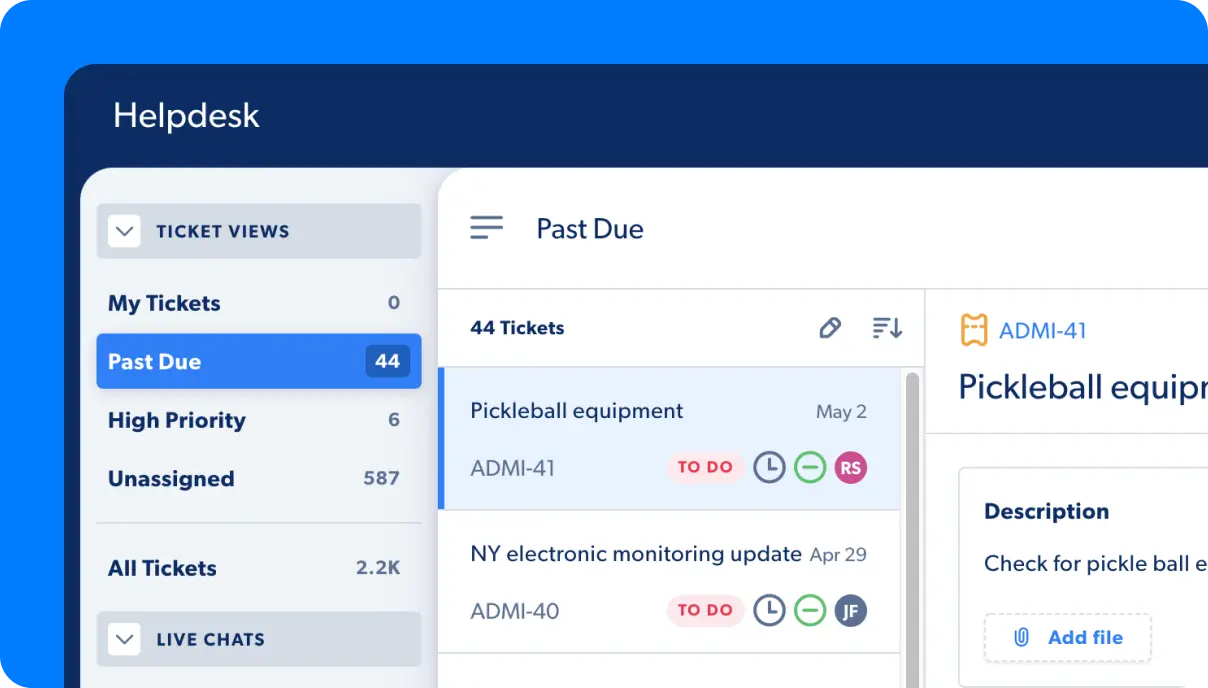Exceptional service is expected by customers, and having reliable IT help desk services is crucial for the smooth operation of your company. About 86% of service teams say a help desk system improves productivity. And, among high-growth service teams, 51% rely on help desk systems, according to Hubspot. As an IT manager or director, selecting the right IT help desk services that align with your business needs and provide exceptional support is essential. This article will guide you through a comprehensive checklist to help you choose the best IT help desk services for your organization.

Automate Your Work
Capacity’s enterprise AI chatbot can help:
- Answer FAQs anytime, anywhere
- Find relevant documents within seconds
- Give surveys and collect feedback
Understanding your business needs: What IT help desk services does your company need?
Before jumping into the selection process, assessing your company’s specific IT help desk requirements is vital. It allows you to gain a clear understanding of the unique challenges and pain points faced by your IT department. By identifying these specific areas of concern, you can prioritize an IT help desk service provider that specializes in addressing these issues.
Additionally, assessing your IT infrastructure and complexity helps determine the level of technical expertise and support needed. This evaluation ensures that the selected IT help desk services have the necessary capabilities to handle your specific hardware, software, and network systems. Then, by documenting your scalability needs, you can ensure that the chosen IT help desk services can grow alongside your business, accommodating increased demands without compromising the quality of service. Conducting a thorough assessment of your company’s IT help desk requirements, will help you lay the groundwork for selecting the right service provider. Consider the following factors:

Assess your IT infrastructure and complexity
Evaluate the complexity of your IT infrastructure, including hardware, software, networks, and systems. Determine if your organization requires specialized support for certain technologies or applications.
Identify your key challenges and pain points
Next, identify the major challenges and pain points faced by your IT department. Whether resolving technical issues, handling user inquiries, or managing service disruptions, understanding your specific pain points will help you find an IT help desk service provider that can address them effectively.
Determine your service level agreement (SLA)
Define your expected service level agreement (SLA) requirements. Consider factors such as response time, resolution time, and availability of support during critical periods. Ensure that the IT help desk services you evaluate can meet or exceed your SLA expectations.
Define and document your scalability
Assess your organization’s growth plans and scalability requirements. Determine if the IT help desk services can scale along with your business. Look for providers who can accommodate future expansion without compromising on service quality.
Your checklist to evaluate IT help desk services
Now that you have a clear understanding of your business needs let’s explore the essential criteria for evaluating IT help desk services. We’re going to look at seven different components to consider:

Reputation and track record
Research the reputation and track record of potential IT help desk service providers. Look for customer reviews, testimonials, and case studies to gauge their performance and satisfaction.
Range of services
Consider the range of services offered by each provider. Ensure they can handle various IT issues and provide comprehensive support across various technologies and platforms.
Geographic coverage and availability
If your business operates in multiple locations or has remote teams, consider the geographic coverage and availability of the IT help desk services. Ensure they can provide support during your business hours and accommodate different time zones if necessary.
SLAs and response times
Review the service level agreements (SLAs) offered by each provider. Pay close attention to their guaranteed response and resolution times for different issues. Make sure their SLAs align with your business requirements.
Proactive monitoring and issue resolution capabilities
Evaluate the proactive monitoring and issue resolution capabilities of the IT help desk services. Look for providers with robust monitoring systems to identify and resolve potential problems before they impact your business operations.
Incident management and escalation procedures
Assess the incident management and escalation procedures followed by the IT help desk services. Ensure they have well-defined processes for handling critical incidents and escalations, minimizing downtime, and providing timely resolutions.
Customer references and testimonials
Request customer references and testimonials from each provider. Contact their existing clients to gain insights into their experience with the service provider. Ask about the provider’s responsiveness, expertise, and overall customer satisfaction.
Next, look into the technical capabilities of the IT help desk services
You’ll want to make sure your IT help desk service aligns with your company’s technical requirements. So, it’s important to evaluate the features and integrations offered by the help desk software. Determine if it provides functionalities such as incident tracking, ticket management, and knowledge base management that are essential for support operations. Additionally, having self-service options along with reporting and analytics is important too in a comprehensive tool. By considering these technical capabilities, you can choose services that not only meet your business needs but also enhance your overall IT support operations.
Help desk software features and integrations
Evaluate the features and capabilities of the help desk software used by the service providers. Look for functionalities like ticket management, knowledge base, automation, and integration with your organization’s other IT service management tools.
Omnichannel support
Customers expect support across channels. Check if the IT help desk services offer omnichannel support, including phone, email, live chat, and self-service portals. This ensures users can reach out for assistance through their preferred communication channels. And make sure your agents have the customer’s information. A recent study found that 72% of customers expect companies to know their purchase history, regardless of how they connect with them.
Remote assistance and troubleshooting
Remote assistance and troubleshooting capabilities are essential for efficient IT support. Determine if the IT help desk services can remotely access and troubleshoot end-user devices, reducing the need for on-site visits and minimizing downtime.
Knowledge base and self-service
A robust knowledge base and self-service portal empower users to find answers to common IT issues independently. Verify if the platform offers a knowledge base with comprehensive documentation and self-service options to enhance user productivity.
Ticket management and tracking
Efficient ticket management and tracking are crucial for maintaining a streamlined support process. Ensure that the platform provides a user-friendly ticketing system that allows you to track the progress of issues and receive updates in real time.
Reporting and analytics
Reporting and analytics capabilities provide valuable insights into your IT support operations. Check if the help desk service offer reporting features that allow you to track key performance metrics, identify trends, and make data-driven decisions.
Security and data privacy
IT security is a top priority for any organization. Assess the security measures the service implements to safeguard your sensitive data. Inquire about their data privacy policies, compliance with industry regulations, and encryption practices.
How to evaluate an IT help desk service’s team and expertise
When it comes to IT help desk solutions, the supporting services are just as important as the features. Look for the following characteristics of a strong support team:

- Technical skills and certifications
- Ensure that the IT help desk service team possesses the necessary technical skills and certifications relevant to your IT environment. Look for certifications such as ITIL, CompTIA, and vendor-specific qualifications.
- 24/7 support availability
- Assess the availability of the IT help desk service team. If your business operates outside regular working hours or has global operations, 24/7 support availability is vital to ensure uninterrupted support.
- Onshore or offshore support team
- Determine if the service offers onshore or offshore support. Consider language proficiency, cultural compatibility, and time zone coverage to ensure effective communication and support delivery.
- Staffing levels and staff-to-ticket ratio
- Evaluate the staffing levels and staff-to-ticket ratio of the help desk. Adequate staffing ensures timely response and resolution of issues, preventing bottlenecks and customer dissatisfaction.
- Training and continuous professional development
- Inquire about the training and continuous professional development programs provided to the IT help desk service team. A well-trained and up-to-date team can deliver high-quality support and stay abreast of the latest technologies and best practices.
- Communication and language skills
- Effective communication is essential for smooth interactions between your users and the IT help desk service team. Assess the team’s language skills, communication channels, and ability to efficiently understand and address user queries.
What to consider for a cost and value analysis
While evaluating IT help desk services, consider the cost and value they provide. Take the following factors into account:
- Figure out your budget and cost structure
- Determine your budget for your help desk. Assess your cost structure, including upfront costs, ongoing monthly fees, and additional charges based on usage or specific service requirements.
- Evaluate their pricing models
- Review the pricing models offered by different IT help desk service providers. Compare their pricing structures, including tiered pricing, pay-per-user, or customized pricing options. Choose a model that aligns with your budget and anticipated usage.
- Look for any hidden costs or extra charges
- Carefully review the service agreements and contracts to identify hidden costs or extra charges that may impact your budget. Be thorough in understanding the pricing details to avoid surprises down the line.
- Calculate your anticipated ROI
- Consider the return on investment (ROI) you expect from the IT help desks. Assess the potential cost savings, productivity improvements, and reduction in downtime that the services can deliver. Calculate the anticipated ROI to evaluate the value they offer.
- Consider your long-term partnership opportunities
- Choosing an IT help desk service provider is a short-term engagement and a long-term partnership. Evaluate the provider’s ability to grow and adapt alongside your business. Look for a provider who can support your evolving needs and be a strategic partner in your IT initiatives.
Are the IT help desk services compatible with your existing technology?
Compatibility with your existing technology infrastructure is crucial for seamlessly integrating IT help desk services. Here are some common things to look for to make ensure a smooth adoption:
- Compatibility with existing IT infrastructure
- Firstly, ensure that the help desk is compatible with your current IT infrastructure, including hardware, software, and network components. Compatibility minimizes disruptions during the implementation phase.
- Integration with service management tools
- Check if the help desk can integrate with your existing service management tools, such as IT service management (ITSM) software, asset management systems, or monitoring solutions. Integration streamlines workflows and enhances efficiency.
- Seamless data transfer and migration
- If transitioning from an existing IT help desk solution, ensure that the service provider offers data transfer and migration support. A smooth migration process ensures minimal downtime and data loss.
- Vendor lock-in and contract flexibility
- Assess the vendor lock-in risks associated with the IT help desk service. Review the contract terms, cancellation policies, and options for scaling up or down based on your future needs. Choose a provider that offers flexibility and freedom of choice.
5 steps to evaluate and select your IT help desk services
To streamline your evaluation and selection process, follow these five steps:

Step 1: Write your RFI or RFP
Firstly, prepare a request for information (RFI) or request for proposal (RFP) document outlining your business requirements, technical specifications, and evaluation criteria. Then, share this document with potential IT help desk service providers to gather relevant information.
Step 2: Create your shortlist and evaluation criteria
Based on the responses received, create a shortlist of IT help desk service providers that meet your initial criteria. Develop a scoring system or evaluation criteria to objectively compare and rank the providers.
Step 3: Conduct interviews and demos
Schedule interviews and demos with the shortlisted providers. Ask probing questions to assess their capabilities, expertise, and cultural fit. Request live demonstrations of their help desk software and support processes.
Step 4: Request and review proposals
Request detailed proposals from the finalists on your shortlist. Evaluate each proposal based on its ability to meet your requirements, proposed solutions, pricing, SLAs, and other relevant factors. Compare and contrast the proposals to make an informed decision.
Step 5: Complete your due diligence and contract negotiations
Before finalizing your selection, conduct thorough due diligence on the preferred IT help desk service provider. Verify their references, certifications, and legal compliance. Negotiate the contract terms and finalize the agreement that best suits your needs.
The process of selecting the ideal IT help desk for your business demands a systematic approach and careful consideration of multiple factors. Therefore, stick to this comprehensive checklist and evaluate each aspect diligently. You’ll identify the IT help desk that perfectly align with your unique business needs. By taking your time and due diligence, you will secure exceptional support for your organization, contributing to its overall success. Making an informed decision like this for your company empowers your IT department and ensures that your employees can work efficiently, benefiting from reliable and effective technical support. When you choose the right IT help desk services, you set the stage for enhanced productivity and streamlined operations within your business.

Automate Your Work
Capacity’s enterprise AI chatbot can help:
- Answer FAQs anytime, anywhere
- Find relevant documents within seconds
- Give surveys and collect feedback













































